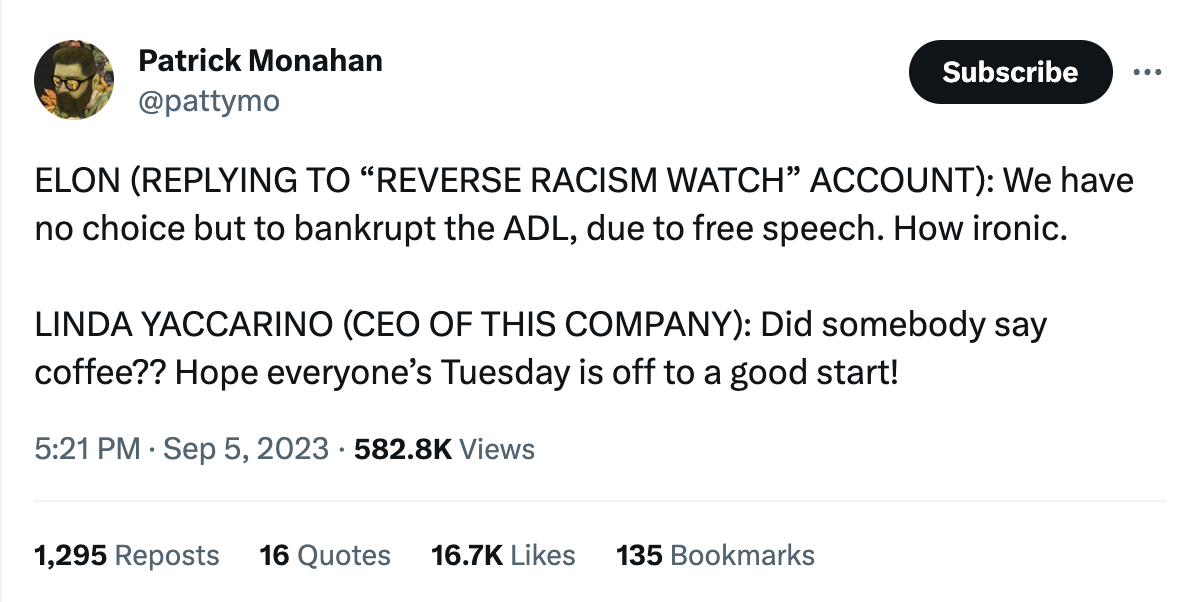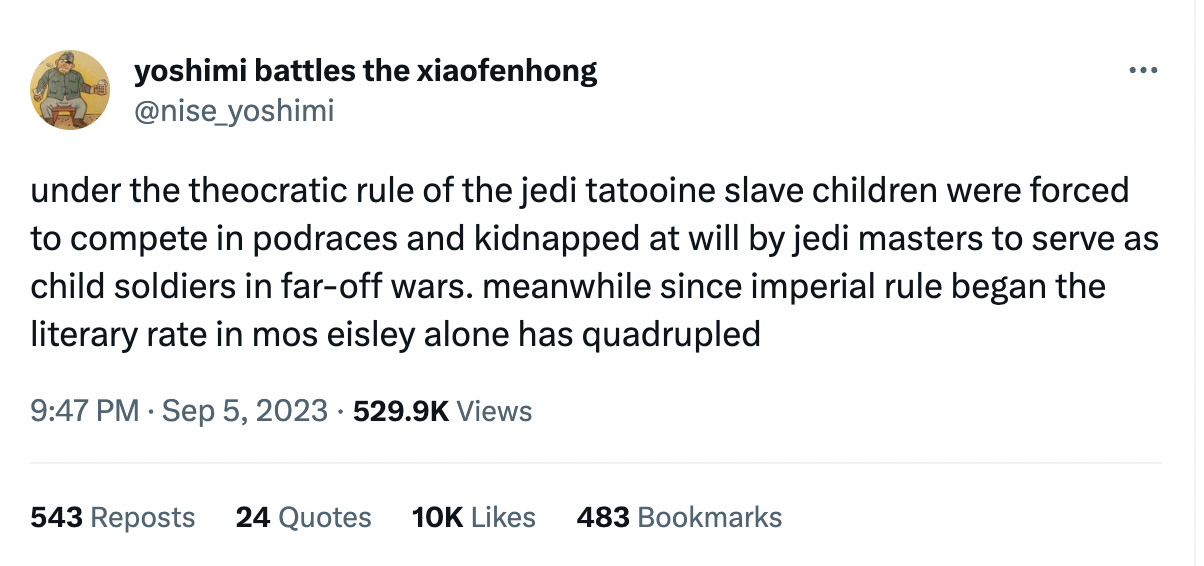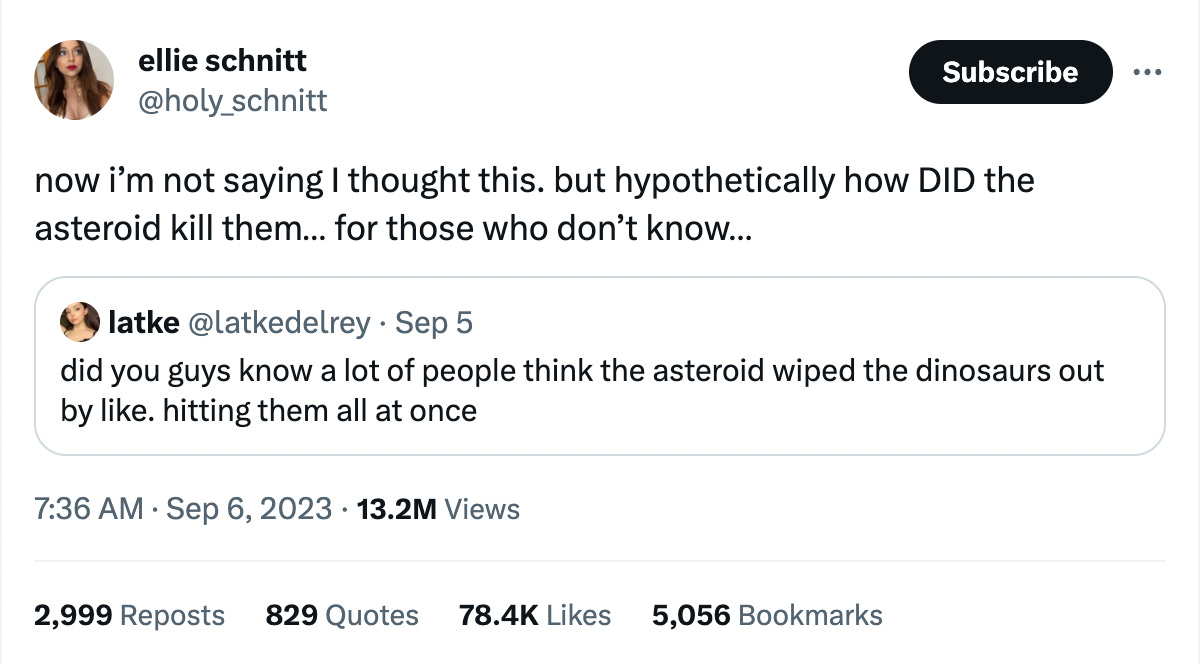Platformer - Google goes to court
Here’s this week’s free column — taking stock of Google ahead of a monumental antitrust case against it and a growing number of threats from generative AI. Do you value independent, ad-free reporting on platforms and global tech policy? If so, maybe kick us ten bucks? It would mean a lot to us. Plus, we’ll email you first with all our scoops — like with our recent look at why the former Twitter may be bracing for an exodus of staffers. ➡️
Google goes to courtOn the eve of a major antitrust trial — and its 25th birthday — the company is bracing for a fightToday, let’s talk about the US government’s first major antitrust trial against a tech giant in a generation. If the Justice Department succeeds in its case against Google, it could lead to radical change around the web. But almost three years after the case was filed, it’s not clear that the government lawyers will be able to bend antitrust law far enough to secure a victory. I. On Oct. 20, 2020, the government formally accused Google of illegally maintaining a monopoly on its search and search advertising businesses. By striking deals with Apple, telecoms, and device manufacturers to make its search engine the default on their platforms, the government argued, Google illegally harmed competition and ensured that it maintains 80 percent market share or higher in search. As I wrote here back then, there’s a reasonable argument to be made that deals like these create a barrier to entry in the search market. Neeva, an upstart search engine founded by an ex-Googler that shut down earlier this year after failing to catch on, was once valued at $250 million — but never could have dreamed of paying the estimated $18 billion a year that Google pays Apple for the privilege of being the default search engine on iOS. The question now is whether Judge Amit P. Mehta, who will decide the case alone, will see things the government’s way. As David McCabe and Cecilia Kang write in the New York Times, the Google case is almost certainly the most consequential US government lawsuit against a tech company since the Justice Department sued Microsoft for bundling its web browser with Windows in 1998. At the same time, that Microsoft trial was a cultural event, featured on magazine covers and dominating headlines for months. By contrast, the Justice Department’s case against Google feels likely to be a much more sedate affair. One possible explanation is that controlling the web browser was a much more consequential issue at the dawn of the internet age than search engine defaults are today. Another is that the government’s case against Google here simply isn’t very good. II. Certainly Kent Walker doesn’t think the government’s case is very good. Walker, the company’s longtime president of global affairs, oversees Google’s legal defenses in the proliferating challenges it now faces around the world. Walker’s argument goes something like this: Google paying for distribution is a standard marketing expense, not unlike a food manufacturer paying to promote their products at the end cap of a grocery store aisle. And those payments promote competition by funding the development of other browsers — Mozilla, for example, uses the revenue from Google to support Firefox and its other projects. If you don’t like Google, you can typically switch the default search engine in your browser within four taps or fewer. And in places where Google isn’t the default search engine, Walker said, most people go out of their way to switch it back. “The majority of people searching on Windows devices use Google,” Walker told me in an interview today. “Defaults matter, but they’re not determinative.” Meanwhile, Walker argues, Google faces legitimate challenges to its dominance in search and search advertising. Amazon in particular has become a strong competitor there; it reported growing ad revenue by 22 percent over the previous year in its most recent earnings report. And the rise of ChatGPT and OpenAI’s emergence as a major consumer internet company present a new set of product and business challenges that Google has only begun to reckon with. Google can push this argument too far, though. I’m willing to accept that TikTok and Reddit offer search alternatives of a sort to Google. But the company’s slide deck includes among its competitors in search such howlers as Wayfair.com, OpenTable, and ESPN. Ultimately, Google controls more than 80 percent of the search market, and its size and power exert powerful control over the web and how money flows through it. The government has to prove that this state of affairs was achieved through illegal means, though. And reading through press coverage, I’m struck by how few of the quoted law professors seem willing to argue that the Justice Department is on firm ground here. If the government somehow manages to win the case, the consensus seems to be that it will be through a novel interpretation of the law. And if it wins, then what? A strange thing about this trial is that the judge won’t consider any remedies unless Google is found liable. Perhaps he might bar Google from seeking distribution agreements like the ones it has on iOS. Perhaps, as some European regulators have done, he will require device manufacturers to ask consumers to choose which search engine they want to use. (This does not seem to have done much for Google’s competitors in Europe, for what its’ worth.) Luther Lowe, Yelp’s chief lobbyist and a longtime Google antagonist, told me today that the judge could consider ordering a breakup of the company. “Given search’s centrality to its bottom line and the fact that a breakup is on the table, this case is an existential threat for Google,” he said. That seems like a stretch. But perhaps the government will introduce evidence over the next few weeks that makes their case more strongly than the original lawsuit did. On one hand, it seems totally reasonable to me to say that as a $1.7 trillion company, Google should be limited in its ability to maintain its dominance through acquisitions and multibillion-dollar distribution deals. But the right way to do that was by passing one of the many laws on the subject that Congress considered over the past few years. Instead, and as usual when it comes to tech regulation, Congress did nothing. If the Justice Department doesn’t win its case, the failure will be lawmakers’ as much as it is the government lawyers. III. The antitrust trial happens to arrive the same month as Google’s 25th birthday. “Search is still at the core of our mission,” CEO Sundar Pichai wrote in a blog post, “and it’s still our biggest moonshot with so much more to do.” Earlier this year, it seemed like Google search might be in for the fight of its life. The introduction of chatbots powered by large language models threatened to prove more disruptive to Google than any other technology in the company’s history. It’s too early to say definitively that Google has beaten its rivals. OpenAI is now on pace to generate $1 billion in revenue this year, driven mostly my the popularity of its GPT language models and subscription products, and is clearly growing quickly. At the same time, market share for Microsoft’s Bing has remained mostly flat despite the high-profile launch of its GPT integration. And Google’s own introduction of generative AI into search and the standalone product have allowed it to mostly keep pace with its peers from a product standpoint, even if the company continues to be perceived as slower and more cautious (or boring) than OpenAI. The bigger legal threat to Google, I believe, will come next year. That’s when the government will mount a much stronger antitrust case against the company, centered on its dominance of the digital advertising marketplace. And while AI clearly presents real business opportunities for the company, the prospect that its infinite output will overrun Google’s spam defenses means that there will be challenges as well. For years now, I’ve hoped that something would arrive that would push Google to compete on fairer terms with its rivals and clean up its decaying search results. That moment arrived this year in the form of lawsuits and generative AI. So far, though, Google has mostly met the challenge. A monumental antitrust case was not quite the 25th birthday party that Google might have wanted. Assuming it wins, though, it will have plenty to celebrate. Want to hang out with me in person? Applications are open for this year’s Code Conference, hosted by me, The Verge’s Nilay Patel, and CNBC’s Julia Boorstin. Join us for live, on-stage journalism with X/Twitter CEO Linda Yaccarino, GM CEO Mary Barra, Microsoft CTO Kevin Scott, and many more speakers to come. It’s all happening September 26th and 27th at The Ritz-Carlton, Laguna Niguel. Follow the latest here. On the podcast this week: Veteran burner, ex-Googler and Forward CEO Adrian Aoun details his harrowing escape from this year’s mud-pocalyptic Burning Man. Then, Anti-Defamation League chief Jonathan Greenblatt joins us to give extremely diplomatic answers about what it’s like to meet with Linda Yaccarino and then immediately be threatened by her boss. Apple | Spotify | Stitcher | Amazon | Google Governing
Industry
Those good postsFor more good posts every day, follow Casey’s Instagram stories. (Link) (Link) (Link) Talk to usSend us tips, comments, questions, and posts: casey@platformer.news and zoe@platformer.news. By design, the vast majority of Platformer readers never pay anything for the journalism it provides. But you made it all the way to the end of this week’s edition — maybe not for the first time. Want to support more journalism like what you read today? If so, click here: |
Older messages
The unbearable slowness of Meta's Oversight Board
Wednesday, August 30, 2023
A 234-day wait to get a ruling in a case about incitement to violence suggests that something important is broken
Why note-taking apps don't make us smarter
Friday, August 25, 2023
They're designed for storage, not sparking insights. Can AI change that?
Elon Musk's creep show
Tuesday, August 15, 2023
Caught in a series of lies about his willingness to fight Mark Zuckerberg, the billionaire's disturbing spiral accelerates
It's time to change how we cover Elon Musk
Tuesday, August 8, 2023
After a weekend of whoppers about X and fighting Mark Zuckerberg, the press should take a more skeptical approach
How the Kids Online Safety Act puts us all at risk
Friday, August 4, 2023
Anti-speech laws are spreading from states to Congress, and the future of online speech could hang in the balance
You Might Also Like
[CEI] Chrome Extension Ideas #180
Tuesday, March 4, 2025
ideas for Figma, GitHub, Job Applicants, and stud ͏ ͏ ͏ ͏ ͏ ͏ ͏ ͏ ͏ ͏ ͏ ͏ ͏ ͏ ͏ ͏ ͏ ͏ ͏ ͏ ͏ ͏ ͏ ͏ ͏ ͏ ͏ ͏ ͏ ͏ ͏ ͏ ͏ ͏ ͏ ͏ ͏ ͏ ͏ ͏ ͏ ͏ ͏ ͏ ͏ ͏ ͏ ͏ ͏ ͏ ͏ ͏ ͏ ͏ ͏ ͏ ͏ ͏ ͏ ͏ ͏ ͏ ͏ ͏ ͏ ͏ ͏ ͏ ͏ ͏ ͏ ͏ ͏ ͏ ͏ ͏
500k subs & 7 figs in revenue
Tuesday, March 4, 2025
This founder was still in college when he sold the business ͏ ͏ ͏ ͏ ͏ ͏ ͏ ͏ ͏ ͏ ͏ ͏ ͏ ͏ ͏ ͏ ͏ ͏ ͏ ͏ ͏ ͏ ͏ ͏ ͏ ͏ ͏ ͏ ͏ ͏ ͏ ͏ ͏ ͏ ͏ ͏ ͏ ͏ ͏ ͏ ͏ ͏ ͏ ͏ ͏ ͏ ͏ ͏ ͏ ͏ ͏ ͏ ͏ ͏ ͏ ͏ ͏ ͏ ͏ ͏ ͏ ͏ ͏ ͏ ͏ ͏ ͏ ͏ ͏ ͏ ͏
1,000,000
Tuesday, March 4, 2025
Taking a moment to celebrate and reflect—and then back to work ͏ ͏ ͏ ͏ ͏ ͏ ͏ ͏ ͏ ͏ ͏ ͏ ͏ ͏ ͏ ͏ ͏ ͏ ͏ ͏ ͏ ͏ ͏ ͏ ͏ ͏ ͏ ͏ ͏ ͏ ͏ ͏ ͏ ͏ ͏ ͏ ͏ ͏ ͏ ͏ ͏ ͏ ͏ ͏ ͏ ͏ ͏ ͏ ͏ ͏ ͏ ͏ ͏ ͏ ͏ ͏ ͏ ͏ ͏ ͏ ͏ ͏ ͏ ͏ ͏ ͏ ͏ ͏ ͏
BSSA #116 - Outsourcing to scale 🚀
Tuesday, March 4, 2025
March 04, 2025 | Read Online Hello everyone! The Wide Event is almost sold out. More than 90% of the tickets have been booked. If you're one of the people waiting until the last minute to purchase,
🔥 The secret factories big brands don’t want you to know 👗👖
Tuesday, March 4, 2025
The best fashion suppliers don't advertise—here's how to find them. Hey Friend , If you've ever struggled to find high-quality fashion manufacturers, there's a reason: The best
Making Wayves
Tuesday, March 4, 2025
+ Girls just wanna have funding; e-bike turf war View in browser Powered by ViennaUP Author-Martin by Martin Coulter Good morning there, Since 2021, VC firm Future Planet Capital (FPC) has secured more
Animal Shine And Doctor Stein 🐇
Monday, March 3, 2025
And another non-unique app͏ ͏ ͏ ͏ ͏ ͏ ͏ ͏ ͏ ͏ ͏ ͏ ͏ ͏ ͏ ͏ ͏ ͏ ͏ ͏ ͏ ͏ ͏ ͏ ͏ ͏ ͏ ͏ ͏ ͏ ͏ ͏ ͏ ͏ ͏ ͏ ͏ ͏ ͏ ͏ ͏ ͏ ͏ ͏ ͏ ͏ ͏ ͏ ͏ ͏ ͏ ͏ ͏ ͏ ͏ ͏ ͏ ͏
upcoming analyst-led events
Monday, March 3, 2025
the future of the customer journey, tech M&A predictions, and the industrial AI arms race. CB-Insights-Logo-light copy Upcoming analyst-led webinars Highlights: The future of the customer journey,
last call...
Monday, March 3, 2025
are you ready? ͏ ͏ ͏ ͏ ͏ ͏ ͏ ͏ ͏ ͏ ͏ ͏ ͏ ͏ ͏ ͏ ͏ ͏ ͏ ͏ ͏ ͏ ͏ ͏ ͏ ͏ ͏ ͏ ͏ ͏ ͏ ͏ ͏ ͏ ͏ ͏ ͏ ͏ ͏ ͏ ͏ ͏ ͏ ͏ ͏ ͏ ͏ ͏ ͏ ͏ ͏ ͏ ͏ ͏ ͏ ͏ ͏ ͏ ͏ ͏ ͏ ͏ ͏ ͏ ͏ ͏ ͏ ͏ ͏ ͏ ͏ ͏ ͏ ͏ ͏ ͏ ͏ ͏ ͏ ͏ ͏ ͏ ͏ ͏ ͏ ͏ ͏ ͏ ͏ ͏ ͏ ͏ ͏
🦄 Dimmable window technology
Monday, March 3, 2025
Miru is creating windows that uniformly tint—usable in cars, homes, and more.






